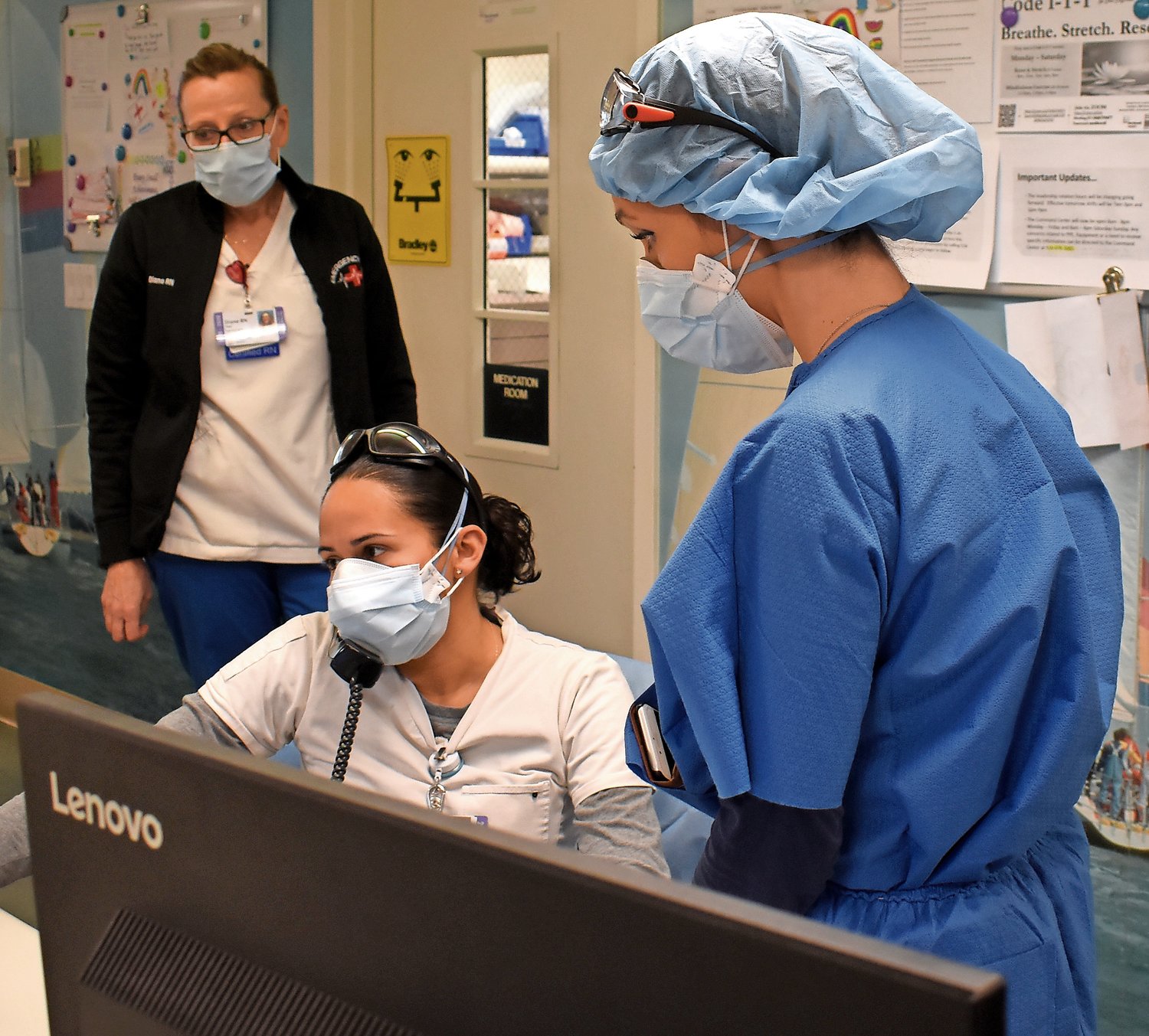For Glen Cove Hospital E.R. doctor, the work seems endless
Dr. John Colletta said that his Centerport neighbors consider him something akin to a leper. They know he works in the emergency room at Glen Cove Hospital, and that his daughter, Morgan, is an emergency-room nurse at North Shore University Hospital in Manhasset.
“No one will come near me or my house,” Colletta, 61, said. “My son won’t even come home. He went to stay with his girlfriend’s family. Between me and my daughter, we’re in the heat of the coronavirus.”
Colletta can still recall his first shift in Glen Cove Hospital’s emergency room — Dec. 12, 1985. Nearly 35 years later, he is the chair of Emergency Medicine at the hospital. On the front lines of the pandemic, he works around the clock to manage the emergency room, where almost all of the patients have Covid-19.
“Where are all the stroke, the appendix patients?” he asked. “I don’t see them. I guess they’re staying home.”
Plenty to ponder about Covid-19
Although the volume of virus patients is decreasing — there have been 233 cases — Colletta said that those who are admitted are acutely ill. Some were tested before at the hospital and have returned much sicker, he said. The majority of patients he is seeing now have severe shortness of breath, and not all are senior citizens.
“I see cases like the 30-year-old man with no medical history who we have to put on a ventilator,” he said. “That’s so young. Twenty percent of people that get the virus are between 25 and 45 years old. Remember those kids in Florida during spring break that gathered on the beach? Three died that we know of.”
Colletta said he wonders why some patients need to go on ventilators while others experience symptoms similar to the common cold. The differences could mean there are different strands of the virus, he said.
The hospital tries to avoid putting patients on ventilators, because the survival rate of those who are has been between 15 and 20 percent. “We’ll put the patient on their side and stomach, which helps their oxygen levels tremendously,” Colletta explained. “But if the guy is 80, with diabetes and an irregular heartbeat, he may be OK at 8 a.m., but how will he be at midnight? He might poop out.”
Because the virus progresses rapidly, some patients who initially look good may not stay that way. “They’ll talk to us, and then three hours later we’ll have to put them on a ventilator,” Colletta said. “And some of them die.”
And he wonders about the prior health of those who die after being put on a ventilator. “How many were smokers or had heart disease,” he said. “And no children are coming in with it. Maybe they have a higher immunity. Could this be some sort of genetic thing?”
Tests aren’t foolproof
The hospital opened up units for Covid-19 patients that had been closed for 12 years — an intensive care unit, a pediatric ambulatory surgical unit and an orthopedic unit — adding 38 additional beds. They are now full, Colletta said.
It’s hard to know exactly how many people have died of the virus there, he added, because when there was a shortage of tests the hospital didn’t want to waste them on those who had already died. Now that there are enough tests, Colletta said, his staff will sometimes do one for a family that requests it.
But the results are not always accurate. “We will initially take an X-ray on people that look like they might have Covid, and test them, but it can come back negative,” he said. “Sometimes I need to take the test three times before it shows that a person has the virus.”
His advice: Someone who has flu-like symptoms should stay home and quarantine for a week, going to the hospital only if there is shortness of breath. And the patient shouldn’t go outside until he or she has been fever-free for at least three days. Everyone else should continue to stay home and wash their hands often.
Colletta said he was proud of his staff. The nurses in his department take additional shifts, he said, which is doubly heroic because many have young children. “These guys are risking their lives,” he said. “The people cleaning the hospital are too.”
There is no treatment for Covid-19, but trials are being conducted at the hospital. Some patients who have low oxygen levels are being given hydroxychloroquine with a Z-pak — an antibiotic used to treat certain bacterial infections, including upper respiratory tract infections — but Colletta doesn’t recommend taking the drugs outside a hospital setting. “Our president is yakking that everyone should use it,” he said. “You can have cardiac arrhythmia. We would need to shock someone who’s having that. People taking this drug need to be monitored.”
Also, he added, a study concluded that taking hydroxychloroquine with a Z-pak for prevention doesn’t work.
Is it airborne?
Because information on the coronavirus is constantly updated, Colletta said, further investigation of how it is spread may be needed.
Residents have debated on North Shore Facebook pages how they would protect themselves from Covid-19, with more than a few saying they would keep their windows closed. “That’s just plain silly,” said Colletta, adding that an infected person would have to be coughing outside someone’s open window for the virus to enter a home. “If somone coughs with the virus, it can stay in the air for three hours, and you need to be within 6 feet of that person or touch a surface the droplets are on and then touch your face.”
Decontaminating at home
When hospital workers come home, they have to decontaminate to protect their families. Colletta’s wife, Cathy, a retired chief nursing officer at the hospital, said the process usually takes a couple of hours.
Her husband takes off all his clothes in the garage and puts them in a large plastic bag. Shoes, coats and keys are kept in the garage as well. Wrapping himself in a towel, he’ll call out that he is running to the shower.
“Then he boils himself in the shower,” Cathy said, “and I go into the garage to take the clothes to be washed immediately. “I throw the bag out, then go [back] into the garage and wipe everything down that he’s touched — the doorknobs, car steering wheel, everything. Then I go into the shower and boil myself. The shower is wiped down next.”
The process is repeated when Morgan, who works nights, comes home. Everyone practices social distancing in her household, Cathy said.
“I felt partially guilty that I didn’t go out of retirement to help, but my most important role right now is to keep my family safe,” she said. “I try to keep everyone’s morale up. And I’m cooking more, to give them something to look forward to.”
Colletta said he was concerned that he might come down with Covid-19, and worried about his daughter even more. “I feel like I’m sending my daughter into the front lines of war,” he said. “She could die. We are risking our lives to save others’ lives. There aren’t many jobs like this.”

 63.0°,
Mostly Cloudy
63.0°,
Mostly Cloudy 








